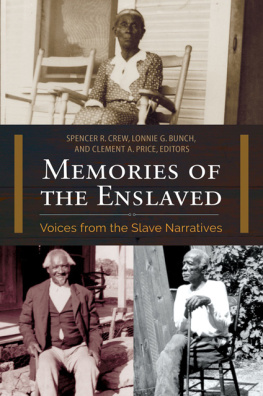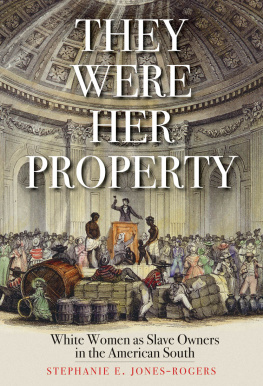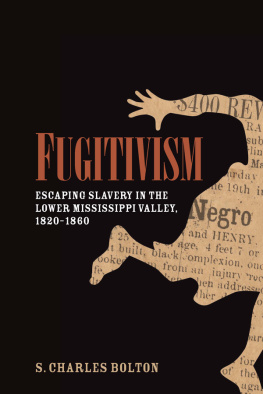Published by Louisiana State University Press
Copyright 2015 by Louisiana State University Press
All rights reserved
Manufactured in the United States of America
First printing
Designer: Mandy McDonald Scallan
Typeface: Sentinel
Printer and binder: Maple Press, Inc.
Portions of this text first appeared in Conflict and the Slave Community: Violence among Slaves in Upcountry South Carolina, Journal of Southern History 74 (August 2008): 551588; He Was No Man Attall?: Slave Men, Honor, Violence, and Masculinity in the Antebellum South, in Fathers, Preachers, Rebels, Men: Black Masculinity in U.S. History and Literature, 18201945, ed. Timothy R. Buckner and Peter Caster (Columbus: Ohio State University Press, 2011), 2340; Slaves, Sex, and Sin: Adultery, Forced Separation, and Baptist Church Discipline in Middle Georgia, Slavery & Abolition 33 (September 2012): 337358; Before Angola: Enslaved Prisoners in the Louisiana State Penitentiary, Louisiana History 54 (Spring 2013): 133171; and A Slave That Will Steal from a Slave, Is Called Mean as Master: Thefts and Violence inside Southern Slave Quarters, in New Directions in Slavery Studies: Commodification, Community, and Comparison, ed. Jeff Forret and Christine E. Sears (Baton Rouge: Louisiana State University Press, 2015), and are reproduced with permission.
Library of Congress Cataloging-in-Publication Data
Forret, Jeff, 1972
Slave against slave : plantation violence in the old South / Jeff Forret.
pages cm
Includes bibliographical references and index.
ISBN 978-0-8071-6111-1 (cloth : alk. paper) ISBN 978-0-8071-6112-8 (pdf) ISBN 978-0-8071-6113-5 (epub) ISBN 978-0-8071-6114-2 (mobi) 1. SlavesSouthern StatesSocial conditions. 2. SlaverySocial aspectsSouthern StatesHistory. 3. ViolenceSouthern StatesHistory. 4. Agent (Philosophy) Social aspectsSouthern StatesHistory. 5. Plantation lifeSouthern StatesHistory. 6. Community lifeSouthern StatesHistory. 7. Southern StatesSocial conditions18th century. 8. Southern StatesSocial conditions19th century. I. Title.
E443.F67 2015
306.3'620975dc23
2015008661
The paper in this book meets the guidelines for permanence and durability of the Committee on Production Guidelines for Book Longevity of the Council on Library Resources.

ACKNOWLEDGMENTS
NINE YEARS ELAPSED from the time I began researching this book intensively in 2005 until the completion of the manuscript. Over the better part of a decade, I incurred a number of intellectual debts to an army of scholars and colleagues, librarians and archivists, many of whom I am fortunate enough to count not merely as professional acquaintances but also as friends. I am pleased to acknowledge here what I sincerely hope is a complete accounting of those individuals.
The first note of thanks goes to Peter Kolchin, who immediately recognized the value of this project after I stumbled upon the idea while researching court records for a previous book. From the beginning, Peter has always stood at the ready to read drafts of conference papers. As the manuscript took shape, he shouldered the added burden of becoming the first person to read the work in its entirety. John Boles, former editor of the Journal of Southern History, became an early champion of my research when some were not so willing. Also valuable in this projects infancy was Dylan Penningroth, who generously offered to sacrifice his anonymity as a reader for the manuscript I submitted to the Journal of Southern History. His true identity exposed, his correspondence with me proved fruitful in the formative stages of the project. Peter, John, and Vernon Burton regularly wrote letters on my behalf as I pursued monies to conduct research, and I apologize to them publicly for abusing their kind natures. Encyclopedia articles written at the invitation of Vernon, Ed Baptist, and Charles Reagan Wilson gave shape to my thoughts on slave violence and forced me to commit ideas to paper. Prior to beginning my labors at the Library of Virginia, Philip J. Schwarz offered useful advice on where to begin the herculean task of researching a topic that is not indexed. And almost from the inception of the book, I have benefited from lively and substantive conversations with Larry McDonnell and Kathy Hilliard, whom I always look forward to seeing.
Several scholars generously provided thoughtful commentary, conversation, and questions to ponder as I presented various portions of this book in embryonic form at conferences in the United States and in England. John Boles, Randal Hall, graduate students at Rice University, and others who attended the January 2007 meeting of the Houston Area Southern Historians (HASH) participated in the first public discussion of this work and prodded me to consider aspects of slave violence that took me years to answer with any degree of precision or coherence. Ed Balleisen and Christine Sears offered helpful remarks on my work regarding the slave economy; Brenda Stevenson, James Sidbury, Christine Heyrman, Dylan Penningroth, John Storey, Eric Kimball, Calvin Schermerhorn, and Ben Schiller on various aspects of the enslaved family. During two trips to present my work in England, Bob Elder, Tim Lockley, Lydia Plath, Sergio Lussana, and Becky Fraser aided my thinking about honor, masculinity, and femininity. Todd Hagstette and John Mayfield offered useful remarks as I wrote an article for their edited anthology on southern honor. Tim, Lydia, and Marianne Fisher-Giorlando shared fruits of their own research beneficial to my project. Paul Finkelmans keen observations spared me at least two embarrassing errors in my research on female slave murderers and gender identity. I also greatly appreciate the input from all audience members at the conferences I attended and Alecia Longs prompt replies to all questions New Orleans. Last but certainly not least, Ed Baptist twice gave a critical reading to the entire manuscript. Although I could not follow through on all of his recommendations, the manuscript still improved substantially as a result of his input, and I am grateful for his investment in the project.
An array of librarians and archivists helped me track down the elusive materials exploited for this study. Although it is impossible to name them all, I do wish to highlight some by name. Minor Weisiger got my research at the Library of Virginia off to a good start, and the entire staff there fielded my onslaught of questions and handled requests for governors papers and other manuscript materials with grace and ease. Steve Tuttle and Marion C. Chandler at the South Carolina Department of Archives and History, Graham Duncan at the South Caroliniana Library, Dale Couch and John Harvey at the Georgia Archives, and Ed Esau at the Historic Natchez Foundation all deserve special mention. Thanks as well go to Mimi Miller in Natchez, Clinton Bagley at the Mississippi Department of Archives and History, Irene Wainwright at the New Orleans Public Library, Linda McCurdy at Duke Universitys Perkins Library, Taffey Hall at the Southern Baptist Historical Library and Archives, and Dave Nelson at the State Library and Archives of Florida. Theresa Hefner-Babb, government documents librarian at Lamar University, relentlessly pursued answers to arcane legal questions of mine, and Lamars interlibrary loan staff filled an enormous number of requests for materials not present in the universitys holdings. The staff members on weekend duty in the basement of Rice Universitys Fondren Library helped me locate some of the more obscure published sources used herein.





